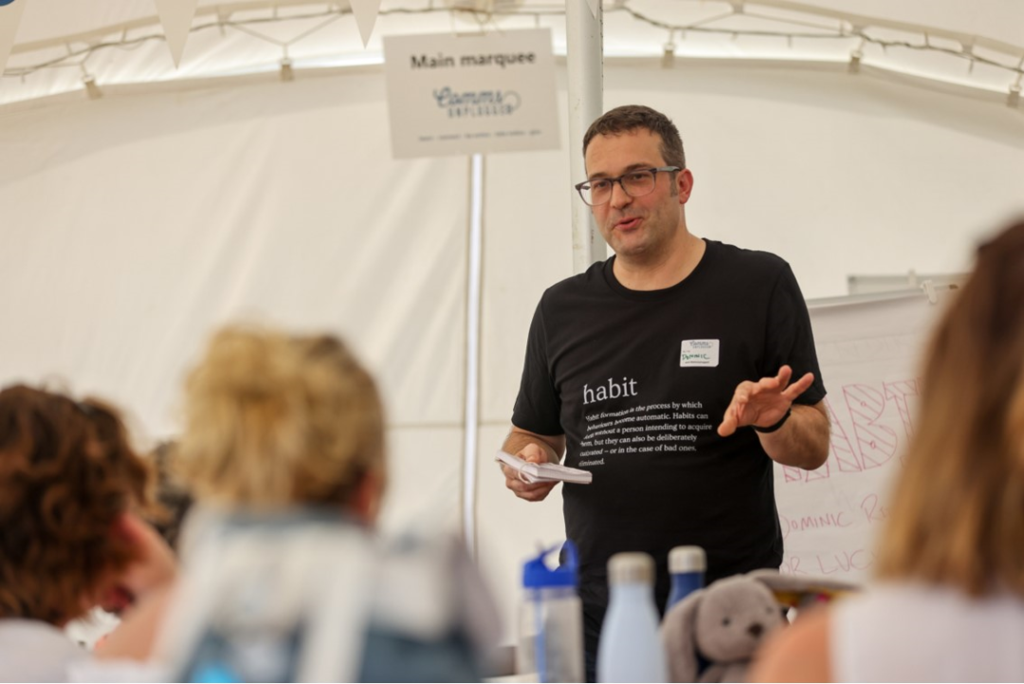
If you missed the workshop at Comms Unplugged this year with Dominic Ridley-Moy and Dr Lucy Mersh from the Behaviour Change Network, here are their thoughts on the science behind habits which applies to campaign planning, as much as it does to your personal life.
by Dominic Ridley-Moy
Habits – small changes, big impact
Habits are the invisible architecture of our lives. They shape our actions, determine our success, and ultimately, they can define who we are.
Understanding and harnessing the power of habits is essential for personal growth and achievement.
Read on for an introduction to habits and how mastering the art of habit-building can make such a big difference in your life.
What is a habit?
A habit is a behaviour that’s been repeated enough times that it becomes automatic when your brain goes into auto-pilot.
It’s therefore different from a routine, which is just a series of repeated behaviours. Eventually, some routines can become habits, but not every routine can become a habit.
At the core of a habit is the concept of the “habit loop”, which consists of four key components: cue, craving, routine and reward. This loop is the fundamental structure of any habit.
Habits expert and author of Atomic Habits, James Clear, outlines the process:
- Cue: This is the trigger that initiates the habit. It could be a time of day, a specific location, an emotional state, or any other sensory input that prompts you to act.
- Craving: This is the psychological desire or urge that drives you to perform the action in response to the cue. It’s the feeling that makes you want to engage in the habit. Cravings can be pleasurable (e.g., the taste of the cookie) or relief-oriented (e.g., the reduction of stress when you bite your nails).
- Response: The response is the actual behaviour or action you take in response to the craving and cue. It’s the habit itself.
- Reward: The reward is the positive outcome or satisfaction you get from completing the action. It reinforces the habit loop and makes you more likely to repeat the behaviour in the future.Understanding this loop allows you to identify and dissect your habits, making it easier to change or create new ones.
The power of small changes
B.J.Fogg, author of Tiny Habits, explains that “building habits and creating positive change can be easy – if you have the right approach”.
As the name of his books suggests, what’s key is to start “tiny” focusing on small actions that you can do in thirty seconds or less.
Taking a vitamin each morning, drinking a herbal tea instead of a caffeinated drink once a day or replacing crisps with a banana are all small things you can start today.
These small habits compound over time, with a much larger cumulative effect over time.
For example, if your goal is to read more books, start by reading just one page a day. It’s a tiny effort that you can easily maintain. Over time, you can increase this to a chapter a day, and eventually, you’ll find yourself finishing books regularly.
Use routine to your advantage
Integrating a new habit into an existing routine can also significantly increase your chances of success. By attaching a new habit to something you already do consistently, you leverage the power of routine to make the new habit stick.
For instance, if you want to start a daily meditation practice but always drink a cup of coffee in the morning, you could stack these habits. After your coffee, spend a few minutes meditating. Over time, this becomes a natural part of your morning routine.
The importance of the environment
The role of the environment in shaping our habits is also critical. But it’s often hugely overlooked.
You can check out Dominic’s range of behaviour change courses here. And on 15 November Dominic will be running a one-day crash course in planning and managing PR campaigns – more here.
Dominic Ridley-Moy is a behaviour change expert, trainer and consultant. You can say hello on Twitter at @DominicRidleyMo
— Sunday 1st October —




